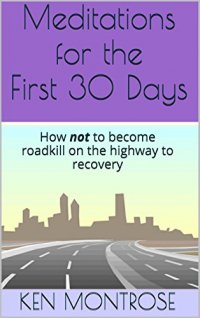Many meditation books lift us above the din of our daily existence. This isn’t one of them. Topics covered include learning from people you don’t like, squeezing the joy out of life, not judging people by their appearances, finding peace in noisy places, and never picking up the first drink or drug, no matter what. All thirty lessons have a page for writing a daily inventory and a gratitude list.
Foreword
From the first day of my recovery I felt caught in the middle. On one side sat the twelve-step traditionalists. Whenever I spoke they told me to “sit down, shut up, take the cotton out of ‘yer ears and put it in your mouth!” Should I need an opinion, they promised to supply one.
On the other side floated people who saw angels everywhere. They explained all experiences in metaphysical terms. They hated the notion that anything might be coincidental and not preordained by the Almighty. Having a summer cold was part of God’s grand plan to help me survive the garbage collectors’ strike.
Between these two extremes, I trudged my own road from alcoholism to sobriety. Along the way I met many people walking a similar path. We held and expressed opinions. Our relationships with God tended to be deep but informal. We were the kind of heretics who believed in coincidences. I have added my own thoughts to their wisdom. With luck the combination will help you find comfort as you take the middle road.
Introduction
This is the first part of Meditations from the Medial Strip. The lessons were written with the first 30 days of recovery in mind. Scattered throughout the daily readings are six crucial messages:
★ Don’t pick up the first drink or other drug, no matter what.
★ Listen with an open mind.
★ Practice rigorous honesty with yourself and others
★ Go to any length to stay clean and sober.
★ Take stock of your recovery, and stay focused.
★ Keep coming back.
Each lesson has a section for your thoughts. There is also a section for taking stock each day. This section asks you to check a box indicating you awoke clean and sober, and another box indicating you went to bed clean and sober. These boxes are the most important part of your recovery. All recovery begins with complete abstinence from alcohol and other drugs.
Each lesson has a space for a gratitude list. Writing a gratitude list helps us see what is good about our situation, and what we can do to improve the future. Sometimes we need to list what could have been worse had we kept drinking and drugging.
Our daily inventories help us remember to squeeze the most out of each day. When you complete this section ask yourself several questions:
1. What did I do today to clear the wreckage of the past?
2. What did I do today to stay clean and sober?
3. What did I do today to strengthen my recovery for the future?
The more effort and thought you put into each lesson, the more you will get from this workbook.












